update 19.
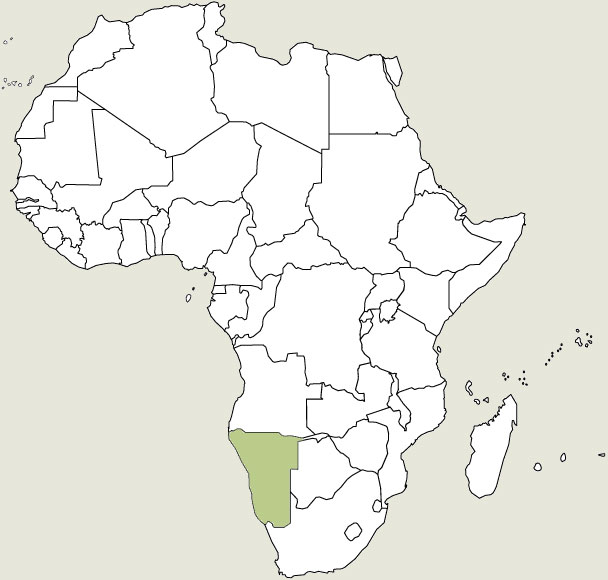 drama in the desert or
drama in the desert or
what are we doing here?
5 September - 5 November 2007
Total kilometers cycled: 30,518
Namibia
Specific country info on routes & roads/food & accommodation/the locals available here.
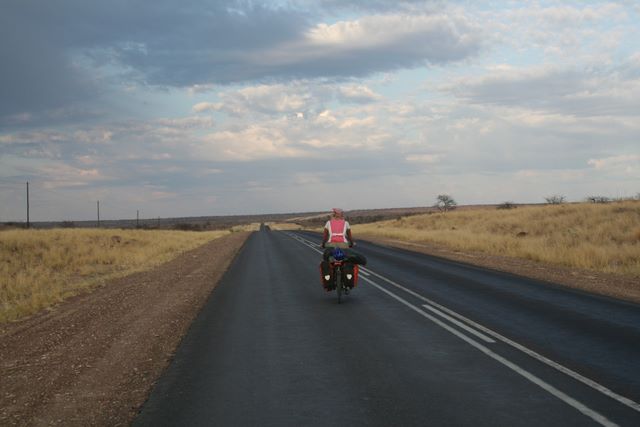 Much
of Africa is dry and desolate country. Our first encounter with
the desert was a 2000 kilometer ride through the Sahara a little more
than a year ago. This always impresses people. They imagine
us heaving our bikes over sand dunes, camping alongside turban-clad
nomads and drinking sweet camel's milk to quench our thirst.
Western knowledge of African geography being what it is, few
people will ooh and ahhh when you tell them you've made it through Namibia. They should.
Much
of Africa is dry and desolate country. Our first encounter with
the desert was a 2000 kilometer ride through the Sahara a little more
than a year ago. This always impresses people. They imagine
us heaving our bikes over sand dunes, camping alongside turban-clad
nomads and drinking sweet camel's milk to quench our thirst.
Western knowledge of African geography being what it is, few
people will ooh and ahhh when you tell them you've made it through Namibia. They should.In fact, there is an easy way through Namibia. It's called the B1. A nice paved road which slopes gently downwards towards South Africa. A sort of dream come true for two cyclists who've endured 16 months on some of the roughest roads in the world. So it was with some surprise that we found ourselves heading out of Windhoek on a gravel road. Perhaps some higher being was trying to send us a message when the lycra-clad mountain biker ahead of us turned back at the point where the tarmac came abruptly to an end. But at that point, we were still in high spirits anticipating this one last little adventure through the desert before the orderliness and easiness of South Africa. We pressed on through the sand.
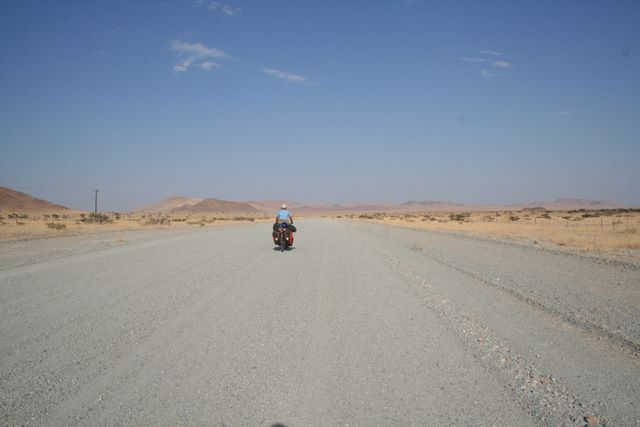 Those who had recommended this scenic jaunt through the Namib desert
had assured us there would be no sand. We were suspicious. We'd
been on plenty of tracks in arid Africa and there was always sand.
The Namib turned out to be no exception. In all fairness, the road
really was quite well-maintained in most
parts. In a 4WD, 500 meters of soft sand poses no problem. 10
kilometers of corrugations pass in a flash. Crosswinds go
unnoticed. A 100 kilometer stretch of uninhabited terrain is a
romantic wide-open space. For a cyclist, 500 meters of sand can
mean 50 minutes of additional agony under a scorching sun. 10
kilometers of corrugations rattle your bones for an hour.
Crosswinds can bring you crashing to the ground and uninhabited
terrain means a parched throat as you ration your diminishing supply of
water. Never ask a motorist for advice on which route to
take if you're cycling.
Those who had recommended this scenic jaunt through the Namib desert
had assured us there would be no sand. We were suspicious. We'd
been on plenty of tracks in arid Africa and there was always sand.
The Namib turned out to be no exception. In all fairness, the road
really was quite well-maintained in most
parts. In a 4WD, 500 meters of soft sand poses no problem. 10
kilometers of corrugations pass in a flash. Crosswinds go
unnoticed. A 100 kilometer stretch of uninhabited terrain is a
romantic wide-open space. For a cyclist, 500 meters of sand can
mean 50 minutes of additional agony under a scorching sun. 10
kilometers of corrugations rattle your bones for an hour.
Crosswinds can bring you crashing to the ground and uninhabited
terrain means a parched throat as you ration your diminishing supply of
water. Never ask a motorist for advice on which route to
take if you're cycling.That was our mistake. We'd listened to these motorized tourists as they described the beauty of the apricot-colored Sossusvlei dunes at sunrise. They'd entranced us with talk of endless mountain vistas and the eerie silence of the lonely plateau. And they'd absolutely scorned our plans to follow that smooth, flat highway. It'll bore you to death, they'd all agreed.
So what's 900 kilometers on gravel roads through a desert we told ourselves? But our hearts weren't really in it. As we stopped for a quick break not more than 20 kilometers out of Windhoek, a couple of tourists pulled up in a 4WD and Eric's first remark was 'maybe they'll give us a lift if we ask nicely'. Amaya was appalled. 'Almost 30,000 kilometers through really rough places like the Congo and you want to wimp out in Namibia?' Not that the idea wasn't appealing to her. There was nothing she would have liked better than to load those 50 kilos onto the bed of a truck and ride in comfort. But it would be far too humiliating.
We pedaled on in the oppressive heat until mid-afternoon when another stretch of sand brought us to a grinding halt. Where were the vistas and the dunes and the glorious sense of being alone on the planet that we had been promised? Thick-necked farmers in baakies (as they pick-up trucks are referred to in these parts) had been covering us in dust all day. We were hot, tired and didn't want to contemplate the almost 900 kilometers of dirt track that separated us from the South Africa border and return to tarmac. In a moment of weakness we turned the bikes around and decided to find our way back to the main paved highway. 'Who cares of it's boring' we told ourselves trying to justify our decision, 'We've had enough suffering.'
Knowing we would reach the tarmac road, civilization and therefore supermarkets the following day, we broke into our food reserves and gobbled down all the cookies meant for the next three days. We went to sleep on full stomachs and awoke the following morning smiling knowing tarmac awaited us. Setting off down the road we stopped to take just one last picture on the track to commemorate the experience. And wasn't it a beautiful place, with the mountains in the distance bathed in a soft orange light. And this road really isn't all that bad. Oh and I'd hate to miss those dunes. They're really not that far. And before you knew it we had turned around again and we weren't heading back towards the tarmac but deeper into the desert.
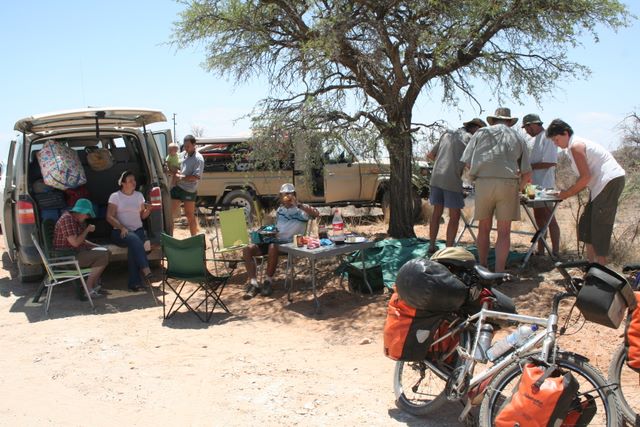 I wish
we could say we never regretted our decision. It was now day two
of our desert drama and we were meant to climb the Spreethoogte Pass.
The traffic thinned out and the farms were spaced wider and wider
apart until we began to understand that 'alone on the planet' feeling.
No farms meant no water and we were running low. We had set
off that morning with 10 liters of water between the two of us.
Unfortunately, we'd lost 3 liters when the bottles we had strapped
on the back bounced off without us realizing it. To be on the
safe
side, we decided to flag down the next vehicle that passed and ask for
water. We started waving frantically at the next cloud of dust
that approached and, with a screech of the brakes, the 4WD came to a
halt. After getting over his initial shock of seeing two cyclists
in the desert, the driver hopped out of his Land Rover, popped open the
back and presented us each with a two liter bottle of ice-cold
water. Then he glanced at his watch and suggested we join him for
lunch. Cold water and food all in one go...this is something like
having your cake and eating it too for a cyclist. Just too good
to be true. These people had tables and chairs. They
weren't crouching in the sand like we usually did. They offered
us cold cokes, 3 kinds of cheese, sausages (for Eric, the
ex-vegetarian)cookies and crackers and so much food! Much better
than warm water and
cold baked beans from a tin.
I wish
we could say we never regretted our decision. It was now day two
of our desert drama and we were meant to climb the Spreethoogte Pass.
The traffic thinned out and the farms were spaced wider and wider
apart until we began to understand that 'alone on the planet' feeling.
No farms meant no water and we were running low. We had set
off that morning with 10 liters of water between the two of us.
Unfortunately, we'd lost 3 liters when the bottles we had strapped
on the back bounced off without us realizing it. To be on the
safe
side, we decided to flag down the next vehicle that passed and ask for
water. We started waving frantically at the next cloud of dust
that approached and, with a screech of the brakes, the 4WD came to a
halt. After getting over his initial shock of seeing two cyclists
in the desert, the driver hopped out of his Land Rover, popped open the
back and presented us each with a two liter bottle of ice-cold
water. Then he glanced at his watch and suggested we join him for
lunch. Cold water and food all in one go...this is something like
having your cake and eating it too for a cyclist. Just too good
to be true. These people had tables and chairs. They
weren't crouching in the sand like we usually did. They offered
us cold cokes, 3 kinds of cheese, sausages (for Eric, the
ex-vegetarian)cookies and crackers and so much food! Much better
than warm water and
cold baked beans from a tin.Hospitality in Southern Africa is something very special. In Europe we'd been turned down by farmers when we'd simply asked to pitch our tent on their land. They eyed us suspiciously and directed us to the nearest country inn. In Namibia we'd been offered accomodation by a complete stranger who saw us in front of the supermarket. Tina gave us the guest room, introduced us to her family, cooked us a delicious dinner and then insisted we stay another day to rest up. When we knocked on a farmer's door in Seeis, Patrick answered, and again we were given a room when all we had requested was a patch of grass. I'm sure nobody in this part of the world would turn us down for camping.
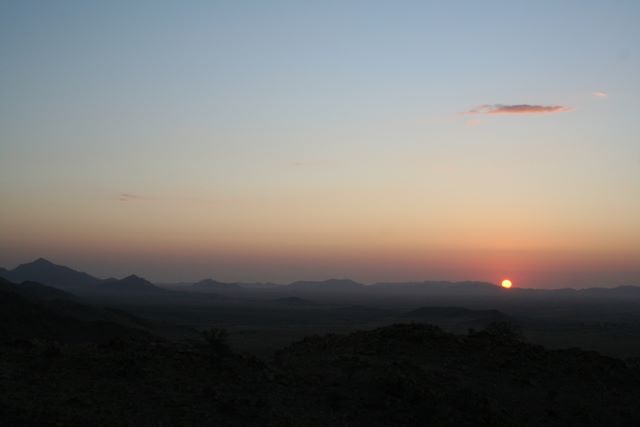
As we set off to tackle the final 50 kilometers up to the pass, our stomachs and water bottles were full and our spirits high. Reaching the small settlement of Nauchas we violated a cardinal rule by passing a source of water without filling up our bottles. We didn't want to waste time fetching water because it was getting late in the day and we wanted to make it up to the pass where supposedly there was a campsite.
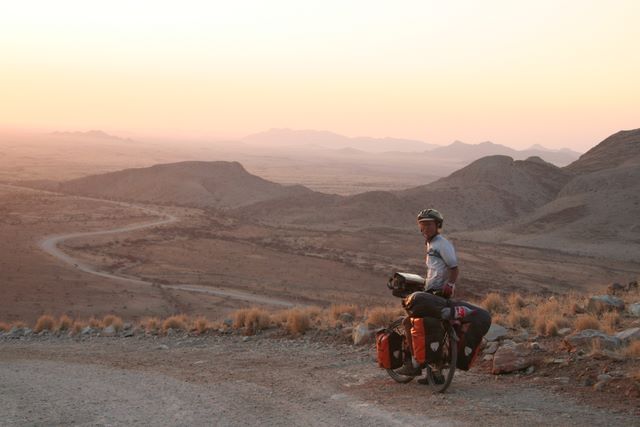 Amaya had her doubts. What fool would put a campsite on a windy
mountain pass? Only 12 kilometers to go but the road was getting
steeper and steeper. As we neared the top, there were gradients of
up to 25%--no wonder only 4WD vehicles were allowed to attempt the
pass. Our legs were burning and our strength almost gone as we finally
made it up the last steep incline, but the incredible view that opened
up before us (almost) made us forget the pain. No campsite was in
view and poor Eric was hit with a barrage of I told you so's and ' I
knew we should have-- filled up our water bottles when we had the chance/ camped at the
settlement 12 kilometers back/followed the paved road/stayed in
Europe/never quit our jobs to cycle through Africa etc. Amaya was
so riled up by the thought of spending the night in the bush with just
a liter of water for drinking, cooking and bathing that the reproaches
would have continued till morning had not a small sign reading 'campsite' come into
view just as we began to lose sight of the setting sun behind the mountains. Saved again.
Amaya had her doubts. What fool would put a campsite on a windy
mountain pass? Only 12 kilometers to go but the road was getting
steeper and steeper. As we neared the top, there were gradients of
up to 25%--no wonder only 4WD vehicles were allowed to attempt the
pass. Our legs were burning and our strength almost gone as we finally
made it up the last steep incline, but the incredible view that opened
up before us (almost) made us forget the pain. No campsite was in
view and poor Eric was hit with a barrage of I told you so's and ' I
knew we should have-- filled up our water bottles when we had the chance/ camped at the
settlement 12 kilometers back/followed the paved road/stayed in
Europe/never quit our jobs to cycle through Africa etc. Amaya was
so riled up by the thought of spending the night in the bush with just
a liter of water for drinking, cooking and bathing that the reproaches
would have continued till morning had not a small sign reading 'campsite' come into
view just as we began to lose sight of the setting sun behind the mountains. Saved again.It was time to change the brake pads when we made it to the bottom of the pass early the next morning. Temperatures were well into the 90's (35 celsius) by mid-morning and we were roasting by the time we arrived for a pit stop in aptly named Solitaire, some 40 kilometers from where we'd camped. The town consisted of a few houses, and a filling station , shop, café and motel all rolled into one. It was nevertheless an obligatory stop because there was simply nothing else out there but sand and the odd sheep farm. Moose makes a mean apple strudel and after 4 helpings we were ready to face the desert once again.
We were headed toward Sesriem, the jumping off spot for visits to the famous dunes of Sossusvlei, and every half hour or so we'd be passed by cheerful-looking tourists in air-conditioned 4WDs. The passengers would hang out the windows, give us a toothy grin and snap our photo. We hated them. The traffic dropped off at about 4PM and around 7PM we finally made it to the campsite, having spent more than 9 hours in the saddle being scorched by the sun, tossed around by the wind and humiliated by fellow tourists who treated us like exotic zoo animals. We were more than fed up.
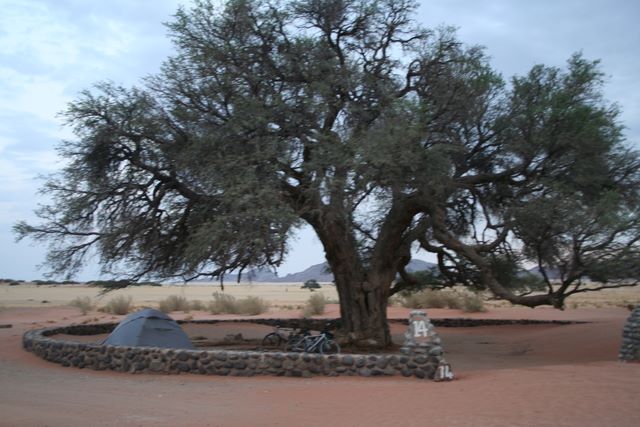 As
is often the case, when you finally reach your breaking point
something wonderful happens that makes you forget all your trials and
tribulations. Sossusvlei is the most popular spot in Namibia and
as such you must reserve well in advance for a campsite. Of
course we hadn't done this, so the kindly gentleman in charge motioned
to some distant spot where we might pitch our tent. We were
probably quite a sight as we struggled to push our overloaded bikes on
the sandy track in search of the 'overflow' camping. It was now
dark and we'd obviously taken a wrong turn and our bikes weren't going
anywhere in the deep sand. And then came our savior, Barry,
beckoning to us to join him at his campsite. Barry is South African and the South Africans must be the
most hospitable people on the continent (although the Moroccans come close). He helped us settle in and
then invited us to a braai. Within an hour all thoughts of the
day's horrors had been dispelled and all this thanks to Barry's
'intervention'. Left to our own devices we would have surely been
squabbling, grumbling and arguing about who gets to finish off the last
of the peanut butter.
As
is often the case, when you finally reach your breaking point
something wonderful happens that makes you forget all your trials and
tribulations. Sossusvlei is the most popular spot in Namibia and
as such you must reserve well in advance for a campsite. Of
course we hadn't done this, so the kindly gentleman in charge motioned
to some distant spot where we might pitch our tent. We were
probably quite a sight as we struggled to push our overloaded bikes on
the sandy track in search of the 'overflow' camping. It was now
dark and we'd obviously taken a wrong turn and our bikes weren't going
anywhere in the deep sand. And then came our savior, Barry,
beckoning to us to join him at his campsite. Barry is South African and the South Africans must be the
most hospitable people on the continent (although the Moroccans come close). He helped us settle in and
then invited us to a braai. Within an hour all thoughts of the
day's horrors had been dispelled and all this thanks to Barry's
'intervention'. Left to our own devices we would have surely been
squabbling, grumbling and arguing about who gets to finish off the last
of the peanut butter.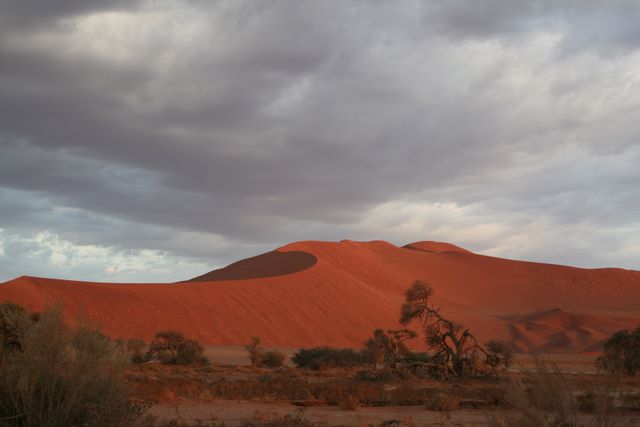 The
following day was a 'day off' to visit the dunes. Still, we were
up at 5AM in order to hitch a ride to the dunes, 60 kilometers away, for
sunrise. Sossusvlei is spectacular and the visit was only marred
by the arrival of a boisterous group of German pensioners on a
package tour. Fortunately for us, most of them obviously enjoyed
their Beer and Bratwurst a little too much and, after much huffing and
puffing and a half-hearted attempt at climbing the dunes, they turned
back, leaving us in relative peace.
The
following day was a 'day off' to visit the dunes. Still, we were
up at 5AM in order to hitch a ride to the dunes, 60 kilometers away, for
sunrise. Sossusvlei is spectacular and the visit was only marred
by the arrival of a boisterous group of German pensioners on a
package tour. Fortunately for us, most of them obviously enjoyed
their Beer and Bratwurst a little too much and, after much huffing and
puffing and a half-hearted attempt at climbing the dunes, they turned
back, leaving us in relative peace.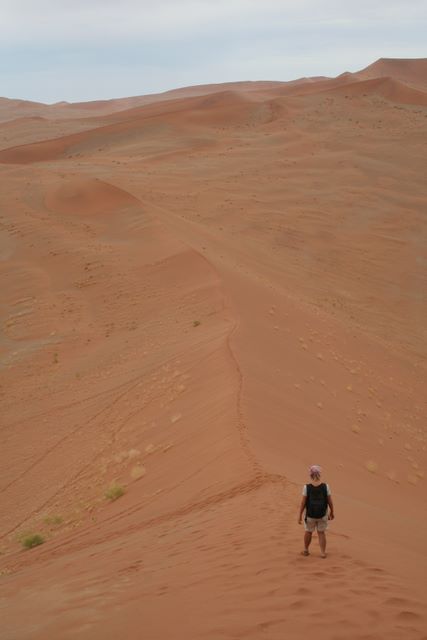 By
mid-morning we were back at the campsite which Barry had kindly
bequeathed us, having himself cut his trip short in order to make it
back to Cape Town to catch the World Cup Rugby finals. The
previous day's long ride had exhausted us, but the tent had heated up
like an oven and we were drenched in sweat almost as soon as we lay
down to rest. Sleep was impossible. In a brief bout of
industriousness, Amaya attacked the laundry, hung it to dry and then
burst into tears the next time she looked up and saw that the line had
snapped and the clothes were being buried in the sand. The
physical exhaustion meant we weren't faring very well
emotionally either and the slightest trouble would set us off. We knew it was
time for an extended break and were anxious to make it to South Africa.
By
mid-morning we were back at the campsite which Barry had kindly
bequeathed us, having himself cut his trip short in order to make it
back to Cape Town to catch the World Cup Rugby finals. The
previous day's long ride had exhausted us, but the tent had heated up
like an oven and we were drenched in sweat almost as soon as we lay
down to rest. Sleep was impossible. In a brief bout of
industriousness, Amaya attacked the laundry, hung it to dry and then
burst into tears the next time she looked up and saw that the line had
snapped and the clothes were being buried in the sand. The
physical exhaustion meant we weren't faring very well
emotionally either and the slightest trouble would set us off. We knew it was
time for an extended break and were anxious to make it to South Africa.During the night, the cool breeze turned into a gale and sand streamed into the tent through all the minute holes that have multiplied over the months. By morning the force of the winds had barely diminished and packing up camp was a nightmare. Cycling was no better, as we were caught in a crosswind and it took most of our strength just to keep the bikes upright. Reaching a crossroads, Eric suggested we bring an end to all the suffering and wait there until a passing truck picked us up. Great idea in theory, but chances of this happening were slim. We were nearing a private nature reserve and the only people on the road were tourists in their rental vehicles. We pedaled onwards, but the strong gusts hampered our progress and morale was at its lowest ebb.
All the heat and sun were draining and we again found ourselves dangerously low on water. We'd already drunk most of the
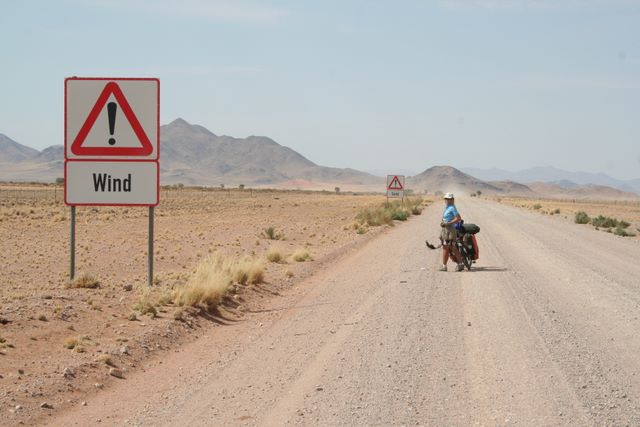 10 liters we'd started off with and there had been no sign of human
existence for several hours. We flagged down the next vehicle we
saw, a Land Rover (rented) full of tourists. What a shock
we had when, after requesting some water, the women in the passenger
seat turned to her husband, her voice filled with annoyance, and
remarked in German, 'aber wir brauchen das Wasser für 3 Tage,'
which translates into 'but we need that water for 3 days.'
Absolutely no pity for two thirsty cyclists stranded in the
desert. Her husband, a much more sympathetic type, gave us each a
small bottle of water. Being rather desperate we accepted with a smile,
all the while fuming at what we saw as petty selfishness. They
were motorized and only 60 kilometers from a settlement where there was
piped and potable water! Before they parted they informed us that
they'd seen no farms or any type of dwellings for a very long time and
we certainly wouldn't reach water or shelter before nightfall.
And then they were off, leaving us alone to contemplate our
dilemma.
10 liters we'd started off with and there had been no sign of human
existence for several hours. We flagged down the next vehicle we
saw, a Land Rover (rented) full of tourists. What a shock
we had when, after requesting some water, the women in the passenger
seat turned to her husband, her voice filled with annoyance, and
remarked in German, 'aber wir brauchen das Wasser für 3 Tage,'
which translates into 'but we need that water for 3 days.'
Absolutely no pity for two thirsty cyclists stranded in the
desert. Her husband, a much more sympathetic type, gave us each a
small bottle of water. Being rather desperate we accepted with a smile,
all the while fuming at what we saw as petty selfishness. They
were motorized and only 60 kilometers from a settlement where there was
piped and potable water! Before they parted they informed us that
they'd seen no farms or any type of dwellings for a very long time and
we certainly wouldn't reach water or shelter before nightfall.
And then they were off, leaving us alone to contemplate our
dilemma.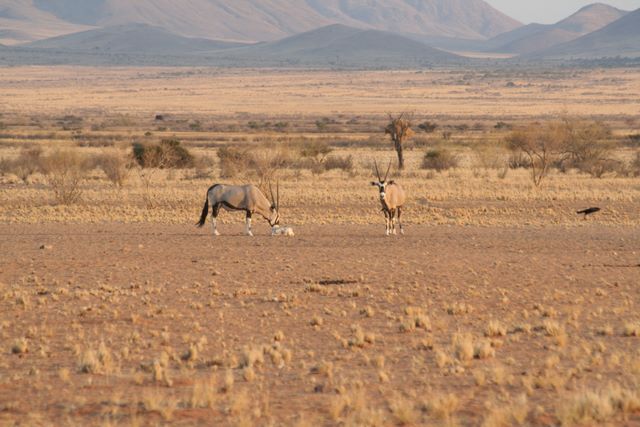 Most
people who cycle through Africa are avid bush campers. That we
had made it almost the entire length of the continent without having
spent a single night alone in the wilds of Africa is an oddity.
If only we had some water.
Most
people who cycle through Africa are avid bush campers. That we
had made it almost the entire length of the continent without having
spent a single night alone in the wilds of Africa is an oddity.
If only we had some water.A few more tears were shed and Amaya thought seriously about what she could have done to bring on this bout of bad karma. She finally concluded that it was a result of her own refusal to share her water with a young Zimbabwean when she had been in Vic Falls.
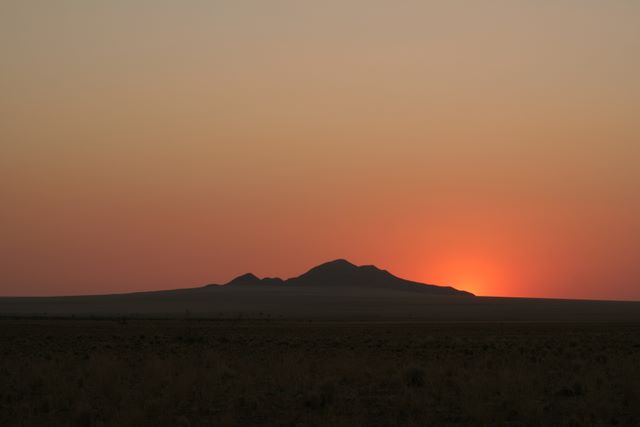 Fearful
that if she let him have a sip he would run away with the precious
Nalgene bottle that was so coveted by all the young men, she had turned
him down when he asked for water. What goes around, comes around
as they say.
Fearful
that if she let him have a sip he would run away with the precious
Nalgene bottle that was so coveted by all the young men, she had turned
him down when he asked for water. What goes around, comes around
as they say.Imagine our surprise and delight when, in the distance, we started to make out what could only be a dwelling of some sort. As we drew nearer we saw that it was a large house set a few kilometers back from the road. A sign at the turnoff read 'Namib Rand Private Reserve Warden's Residence'. What luck! We wouldn't die of thirst, be killed by a band of marauding bandits or eaten by a pack of hungry mountain zebras after all. Nils, the burly warden, welcomed us with a warm handshake and acted as though he had been expecting us. There was no need to explain our predicament. Hospitality came naturally to him and he lead us to the fully-furnished guest bungalow and told us to make ourselves right at home. Whew--things turned out alright in the end yet again.
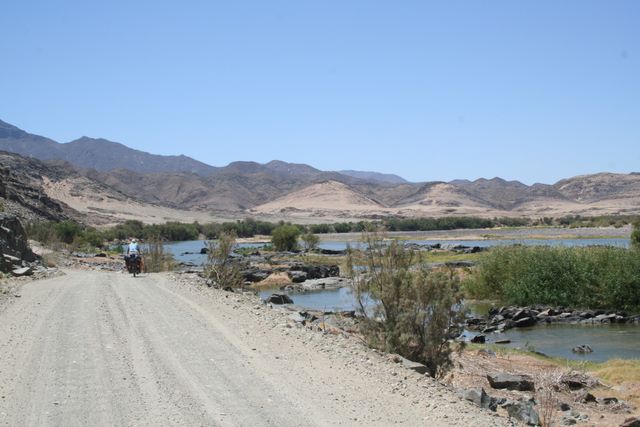 Four
more uneventful days hammering on through the desert and we made it to
the Orange River and our first view of South Africa on the far side.
The slender patch of vegetation near the river banks was a veritable
oasis after seeing so much sand. We were so overjoyed to be out
of the desert that we didn't even mind all the hills. At one point
we entered a 'Restricted Diamond Mining' area where a sign warned that
leaving the main road was forbidden. Spotting a water tap not far
from the road, we took our chances and ventured over to see if we might
be able to fill our bottles. Almost immediately an AK-47
toting guard was at our side. We took his grunt as permission to
fill the bottles, but as we were dismounting the bikes, two Rambo
lookalikes pulled up in a pick-up and gave us the evil eye. They
were clearly highly disturbed by our presence and might have been
trigger-happy psychopaths for all we knew. We did our best to
look like
Four
more uneventful days hammering on through the desert and we made it to
the Orange River and our first view of South Africa on the far side.
The slender patch of vegetation near the river banks was a veritable
oasis after seeing so much sand. We were so overjoyed to be out
of the desert that we didn't even mind all the hills. At one point
we entered a 'Restricted Diamond Mining' area where a sign warned that
leaving the main road was forbidden. Spotting a water tap not far
from the road, we took our chances and ventured over to see if we might
be able to fill our bottles. Almost immediately an AK-47
toting guard was at our side. We took his grunt as permission to
fill the bottles, but as we were dismounting the bikes, two Rambo
lookalikes pulled up in a pick-up and gave us the evil eye. They
were clearly highly disturbed by our presence and might have been
trigger-happy psychopaths for all we knew. We did our best to
look like 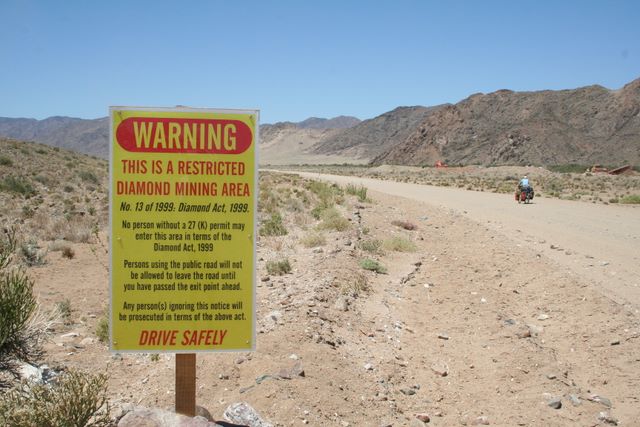 the innocent tourists that we are and hurried on our way.
the innocent tourists that we are and hurried on our way.Some 10 kilometers before the border post we hit tarmac again and solemnly promised each other to stick to paved roads in the future. Namibia was quite an adventure: intense highs as we swooped down a mountain pass or gazed at the ever-changing dunes in the distance and horrific lows, as encounters with the elements sapped our energy and will to continue.
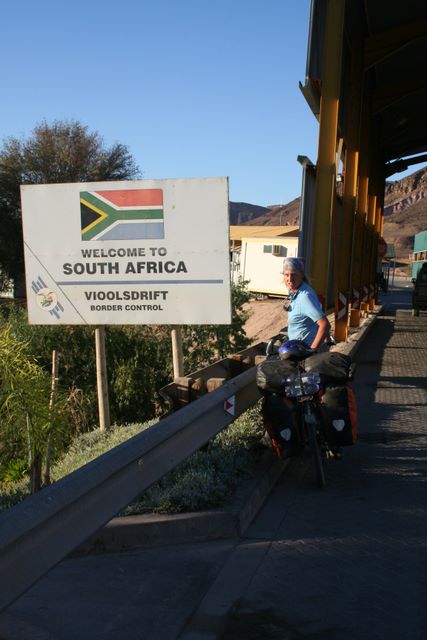 Perhaps
we're being a tad melodramatic in recounting this past month's events.
Put it down to the accumulated fatigue of almost a year and a
half on the road. At the moment, we're being spoiled as the
guests of Ken and Angela, two intrepid adventurers who have
criss-crossed Africa by land rover, bicycle and motorbike. They tell us
their home is technically within the Cape Town municipality, so maybe
we'll pile the bikes in the back of the baakie for the final 45 kilometers into Cape Town proper. It is tempting. Stay tuned, another update coming to you soon!
Perhaps
we're being a tad melodramatic in recounting this past month's events.
Put it down to the accumulated fatigue of almost a year and a
half on the road. At the moment, we're being spoiled as the
guests of Ken and Angela, two intrepid adventurers who have
criss-crossed Africa by land rover, bicycle and motorbike. They tell us
their home is technically within the Cape Town municipality, so maybe
we'll pile the bikes in the back of the baakie for the final 45 kilometers into Cape Town proper. It is tempting. Stay tuned, another update coming to you soon!contact us at: worldbiking@gmail.com
Support our chosen charity and help educate girls in Africa-more info here

